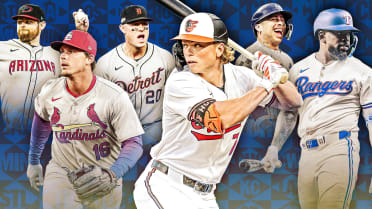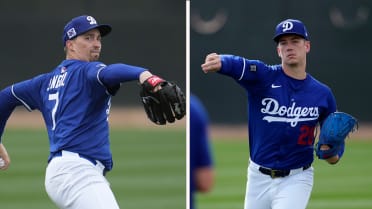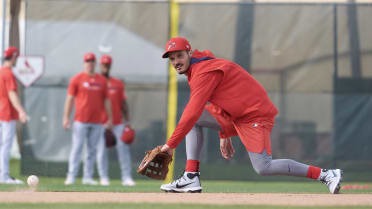Here's the HOF case 'for' and 'against' Mattingly
Don Mattingly is once again up for consideration for the National Baseball Hall of Fame as one of 10 finalists vying for induction on the 2020 Modern Baseball Era ballot. Mattingly will learn his fate on Sunday, when the results will be announced on MLB Network at 8 p.m. ET.
The former Yankees great seemed to be well on his way to earning a place in Cooperstown in the late 1980s before a back injury derailed his career -- and ultimately cast doubt over his candidacy.
After retiring following the 1995 season at the age of 34, Mattingly went on to receive just 28.2% of the vote in his first year on the ballot in 2001. Though he received enough votes to remain on the ballot for the maximum 15 years, Mattingly never received another total as high as that first year.
Mattingly dropped off the ballot after receiving just 9.1% of the votes in his 15th and final year of candidacy in 2015. He was later named a finalist on the Modern Era Ballot in 2017, though he received fewer than seven votes from the 16-member committee (12 needed for election).
Is this the year Donnie Baseball finally breaks through into Cooperstown? Let's take a look at the case both for and against Mattingly's potential induction.
The case for Mattingly
• Mattingly was arguably the best player in Major League Baseball for a six-year span from 1984-89. He averaged 27 homers and 114 RBIs, while putting up a .327/.372/.530 batting line in those six campaigns. The .530 slugging percentage led all qualified hitters, while Mattingly also paced the Majors in extra-base hits (428) and RBIs (684) during that six-year span.
• Mattingly took home nine Gold Glove Awards and the 1985 American League Most Valuable Player Award -- a combination that has proven to be Hall of Fame worthy. He is one of just 11 players to win at least nine Gold Gloves and an MVP, and eight of those 11 are in the Hall of Fame. The only three from that group yet to be inducted to Cooperstown are Ichiro Suzuki (who figures to be a first-ballot Hall of Famer when he's eligible in 2025), Keith Hernandez and Mattingly.
• Though he hit a respectable 222 homers, Mattingly wasn't just a power-hitting first baseman. He finished his career with a .307 average, making him one of just eight first basemen in Major League history to hit at least .305 with 200 homers. That list includes five Hall of Famers in Lou Gehrig, Jimmie Foxx, Johnny Mize, Hank Greenberg and Jim Bottomley. The other three: Mattingly, Todd Helton (received 16.5% of the vote in his first time on the ballot last year) and current Reds first baseman Joey Votto.
• Mattingly remains one of just three players to homer in a Major League record eight consecutive games. He started his run on July 8, 1987 with a two-homer game against the Twins, and later added another two-homer effort on his way to hitting a total of 10 home runs in an eight-game span. The only other players in big league history to homer in eight consecutive games are Dale Long and Hall of Famer Ken Griffey Jr.
• While one player being in the Hall of Fame does not necessarily mean all similar players should have a spot in Cooperstown, it's hard not to compare Mattingly's resume to that of Kirby Puckett. As far as traditional stats, Mattingly finished with 222 homers and 1,099 RBIs to Puckett's 207 home runs and 1,085 RBIs. Mattingly had a .307/.358/.471 batting line to Puckett's .318/.360/.477. Mattingly retired at 34 years old after playing 1,785 games due to back issues, while Puckett called it a career at 35 after 1,783 games due to glaucoma.
Yet when both players appeared on the ballot for the first time in 2001, Puckett cruised into Cooperstown with 82.1% of the vote compared to Mattingly's 28.2%. There were some key differences. Crucially, Puckett won two World Series titles compared to zero for Mattingly, and Puckett was remarkably consistent over 12-year career, which included 10 All-Star selections and ended with him hitting .314 with 23 homers and 99 RBIs in his final season. Mattingly's career, meanwhile, was separated into two distinct halves -- the latter of which is detailed below.
The case against Mattingly
• Though Mattingly was one of the game's elite talents from 1984-89, he was an entirely different player starting with the '90 campaign in which he was limited to just 102 games due to a congenital disk deformity in his back. Mattingly averaged only 10 homers and 64 RBIs over his final six seasons, while hitting .286/.345/.405. He topped out at 17 homers and 86 RBIs during that stretch. Though his superb defense continued throughout his career, Mattingly ended his career by hitting .288 with seven homers and 49 RBIs over 128 games in '95.
• Notably for a Yankees star, Mattingly never won a World Series title and -- playing almost his entire career before the introduction of the Wild Card -- only appeared in one postseason series, the 1995 ALDS against Seattle. To his credit, Mattingly delivered in his one October chance, going 10-for-24 (.417) with four doubles, one homer and six RBIs over those five games.
• Mattingly finished his career with an .830 OPS -- not a typical Hall of Fame threshold for a first baseman. Of the 17 first basemen in the Hall of Fame, Mattingly's .830 OPS would be higher than only three -- Jake Beckley, High Pockets Kelly and Frank Chance, all of whom debuted prior to the Live Ball Era (since 1920). Beckley put up a .797 OPS from 1888-1907, Kelly had a .794 OPS from 1915-32 and Chance posted a .788 mark from 1898-1914.
• In fact, Mattingly's .830 OPS isn't just low for a potential Hall of Fame first baseman, but it's on the lower side for any player who did not have some sort of speed element to his game. Though 76 Hall of Famers had a career OPS below .830, all 76 had more career triples than Mattingly, and all but one, Ernie Lombardi, had more stolen bases.
• With Mattingly's career cut short due to injury, his raw numbers of 222 homers and 2,153 hits don't stack up very well either. Only two Hall of Fame first basemen finished with fewer homers and hits than Mattingly -- the aforementioned High Pockets Kelly, whose career spanned 1915-32, and Frank Chance, who played from 1898-1914.
Paul Casella is a reporter/editor for MLB.com based in Philadelphia.




